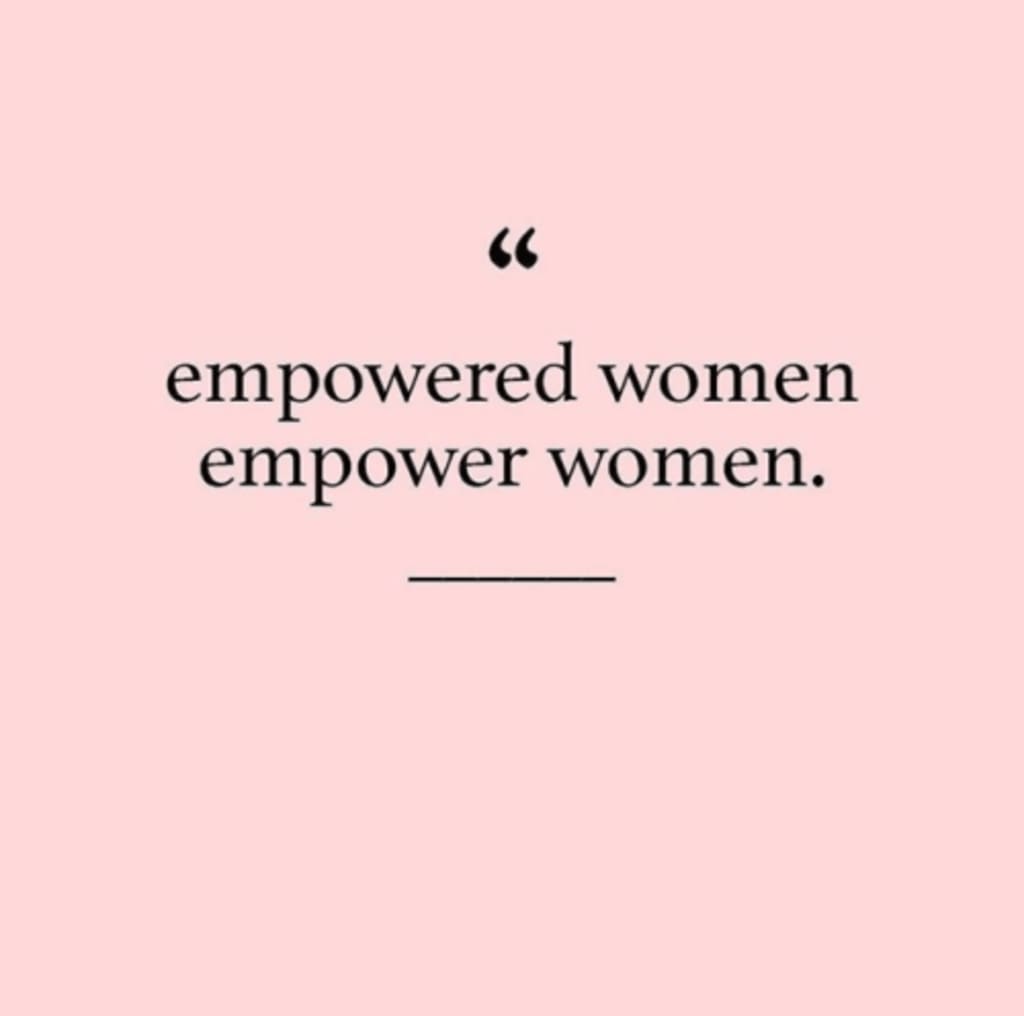The Cycle of Hate Towards Women
Why we, as women, aren't allowed to make choices, act upon our wishes, or even exist at all?

We all have heard or used the phrase “I am not like the other girls.” As we grow, the sentence started to bother some of us, raising questions as to why it is used, and why it exists in the first place. We can pick the easy route and say it is caused by deeply internalized misogyny that we especially see in younger women. While it can be a reason to belittle an entire gender, it is not enough to satisfy the question.
For a society to function, everyone has a place, assigned roles and values. When these roles start to keep people from creating their own truth, they get almost venomous. Patriarchy by definition, is a system of society in which men hold the power and women are mostly excluded. Women are valued less, therefore their interests and creations are valued less. Even though specified gender roles restrict both boys and girls equally, we never see a boy strictly disliking blue and trying to stay away from it religiously, whereas most of us women have a constantly internal debate while making every single decision, even if it is as simple as picking a color for a shirt.
This inner conflict in younger women creates a widening gap between girls who are aware of the roles and conform to them, and girls who are aware of the roles and do not conform to them. It is not a case of superiority or demonizing any of the options. There is nothing wrong with enjoying given values, and there is nothing wrong with having different preferences. But saying girls who do not go out of the gendered box do not have the intellectual or moral capacity to do so is simply not fair, because even though it is wrong to create a straight line that we are only allowed to exist on, there is nothing wrong with being directly on that line.
Liking pink, dressing up, being interested in fashion and makeup, being emotional, enjoying many or all of the things that we associate with femininity, does not directly make a person superficial or shallow. It simply makes a person that specifically enjoy said things. Labeling them “the other girls”, looking down upon what women are expected to enjoy and create, how they are expected to behave like, and creating a stigma around being feminine feeds the narrative that men and what they enjoy hold more value in contrast to women.
We all have standards that are put in front of us, and whether it’s a career field or simply enjoying a genre of books, we now have two boxes that we are expected to fill. To be like the “other girls”, or to be a girl that uses the phrase “not like the other girls”. The dimension that is created through this categorization not only divides people but it also creates a different norm out of people who reject the already existing norms. And as humans, it is instinctual to try to position yourself and feel a sense of belonging to a group. That being said, blaming women who try to fit either of these categories is not only unfair, but cruel.
It is punished if a woman is hyper feminine, and it is punished when a woman chooses not be feminine. Society does not accept any form of womanhood as valid, so it isn’t only the internalized misogyny that’s pushing young girls to pursue different hobbies, careers, ways of living. Nothing they do seems right.
To be quirky, to be likeable, to be relatable, to be “one of the boys”, to be anything but ourselves, is at times comforting. I grew up with the understanding that I wasn’t completely one thing or the other. Sometimes I wanted to dress up, but I also had this insane amount of passion and knowledge about football that I felt like I needed to hide the days I was wearing pink dresses. Sometimes I had no interest in fashion, or what my female friends were interested at the time, not being able to fit into any group postponed my growth to become my unapologetic self. And until the day I found the comfort to appreciate my own values and hobbies, I found comfort in that phrase that I didn’t know put so many people down just because they weren’t like me and I wasn’t like them.
As an insider to that phrase, I can safely say it created a sense of identity and belonging. Even though I didn’t use the phrase out loud to put a woman down, I carried the underlying thoughts within me and my actions. At the time, not being feminine, having “worthwhile interests” was something that I took pride in. I didn’t want to be immediately labeled as anything, instead I wanted to be recognized for the person who I was. It took me a long time to understand there was nothing wrong with the label, it was the act of labeling I wanted to avoid, not being acknowledged for the woman that I was. I wasn’t trying to stand out or seem interesting, because it is not unusual therefore not interesting to not be girly, because there isn’t a right way of being girly that isn’t constructed by society.
I have a lot of empathy for women who define themselves differently than other women, I don’t think pointing an arrow at them, painting them as the villains of our feminist story, blaming them for putting down other women is a solution. Justifying one kind of hate with the other is not acceptable for the fact that we cannot guarantee that this won’t result in different declarations of hate towards women. If we can understand the reason of the sentence, we can stop it, but if the only thing we do is start a witch hunt, then all that does is lead to another superiority complex. “I am not like the girls who say that they are not like the other girls.”
The biggest misconception around this topic is that these women try to impress men by standing out. The logic is that women who identify differently than “other women” try to create a perfect image by pretending to embrace the imperfections, rooted from insecurity. This suggests that women who don’t value things they are taught to value should feel insecure and broken, or confidence in who they are is fabricated. And the superiority that masculinity carries in theory suggests women can only have redeeming qualities if they are approved by men, they can only be truly confident if they have male attention.
There is no way out. Even at times when I was trying to ditch the search of trying to find an appropriate label for myself and accepting the aspects that made up my personality, I was, again, not accepted by any group. I was very vocal about my music taste and my interest in football, I was sharing things that were important to me, that I knew I was good at, that I knew I had extensive information about. But when talking about football, men opted to finding my hobbies a "turn off" for women, started to quiz me to see I was “faking it” and women put me down, thinking I was creating fake interests just for male attention and approval.
On top of being criticized for being too much of a “woman” or not being enough of a “woman”, we are also stripped of our identity. Nothing that we do is acceptable unless we do it for the pleasure or convenience of men, it is also not acceptable to do things for the attention of men. Does this mean that we should not act upon anything, or that we should be completely still, like an object we are usually painted to be?
We do not exist for men, we do not dress for men, we do not act for men, we do not exist to please men, and we do not exist for the sole purpose of creating a mystery. We do not have to interesting, or likeable, but this groundbreaking revelation (!) scares our society. Instead of teaching young girls that we do not, in fact, have to do anything for the pleasure of others, we create debates about how women act as if they are programmed to hate one another.
Femininity has worth, without any strings attached. And there isn’t a singular way to be feminine or to be a woman. Needless to say, women are not defined by their interests, or how they act, or who they befriend. We are people, human beings, with real endearing connections to other women, with dreams and accomplishments, we cannot be advertised as almost cartoonish two dimensional beings.
Women now learn to empower themselves, sexually, academically, socially, psychically. And this empowerment is unalienable. It ends up being the only right women have that no one except themselves can take away. While we continue to grow together, learn from our uneducated mistakes, we will keep earning every right that we deserve together, as “not like the other girls”, and “the other girls”.
Negative notions make up our thought processes even if we are not aware of it, but it is also a choice to grow out of our perceptions. Embracing our identity, embracing others without expecting them to change and mold their identity is the only way we can stop this cycle from coming back to us. The prerequisite for a woman to stay true to her identity and her story is just courage, not competition.






Comments
There are no comments for this story
Be the first to respond and start the conversation.